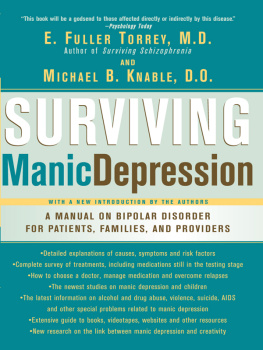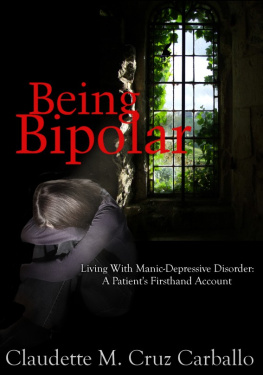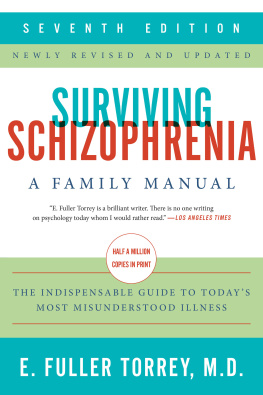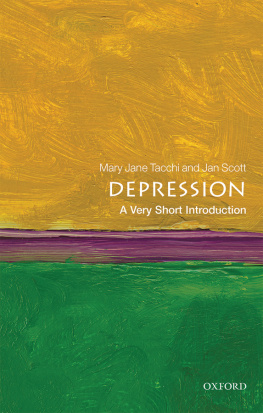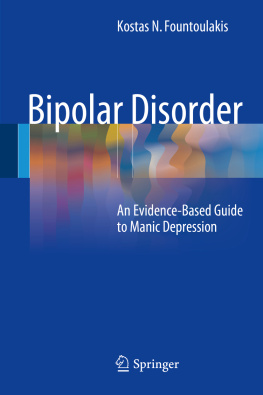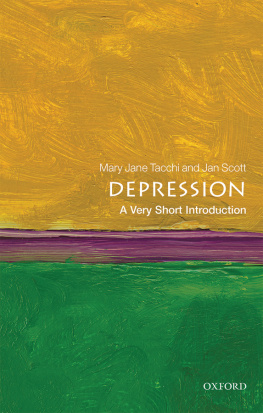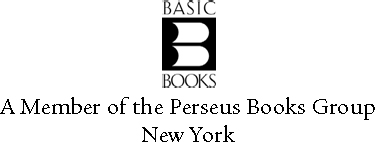Praise for Surviving Manic Depression
A lucid, thorough guide to every aspect of living with bipolar disorder.... This is a valuable resource for anyone touched by the illness.
Publishers Weekly
By far the best general book available on the subject....
Library Journal
Exceptional.
Todays Books
An immense, complete and useful resource.
Metapsychology
The authors have done a remarkable job of digesting the body of available literature and making it easy to read.
Psychiatric Services
This manual on bipolar disorder is the most complete and current available.... A definite must for the libraries of consumers, providers, and families.
NAMI Advocate
Details virtually every aspect of the disorder.
Dallas Morning News
A comprehensive up-to-the-minute guide to all aspects of the disease.
The Reading Forum
Like Surviving Schizophrenia, Surviving Manic Depression will be the therapeutic bible for patients, families and caregivers of people with manic depression (bipolar disorder).
Richard J. Wyatt, M.D., Chief of Neuropsychiatry,
National Institute of Mental Health
Magnificent! So much information in such an understandable form. What a comfort this would have been 25 years ago when I was diagnosed. No one should have to fight this disease alone.
U.S. Representative Lynn Rivers
(Michigan13th District)
ALSO BY E. FULLER TORREY, M.D.
The Invisible Plague (2001, Senior Author)
Out of the Shadows (1997)
Schizophrenia and Manic-Depressive Disorder
(1994, Senior Author)
Freudian Fraud (1992)
Criminalizing the Seriously Mentally Ill
(1992, Senior Author)
Frontier Justice:
The Rise and Fall of the Loomis Gang (1992)
Nowhere to Go:
The Tragic Odyssey of the Homeless Mentally Ill (1988)
Care of the Seriously Mentally Ill (1986, Senior Author)
Witchdoctors and Psychiatrists (1986)
Surviving Schizophrenia: A Family Manual
(1983, 1988, 1995, 2001)
The Roots of Treason:
Ezra Pound and the Secret of St. Elizabeths (1983)
Schizophrenia and Civilization (1980)
Why Did You Do That?
Rainy Day Games for a Postindustrial Society (1975)
The Death of Psychiatry (1974)
SURVIVING MANIC DEPRESSION
A Manual on Bipolar Disorder for Patients, Families, and Providers
E. Fuller Torrey, M.D.
and
Michael B. Knable, D.O.
Copyright 2002 by E. Fuller Torrey, M.D., and Michael B. Knable, D.O.
Hardcover edition first published in 2002 by Basic Books,
A Member of the Perseus Books Group
Paperback edition first published in 2005 by Basic Books.
All rights reserved. Printed in the United States of America. No part of this book may be reproduced in any manner whatsoever without written permission except in the case of brief quotations embodied in critical articles and reviews. For information, address Basic Books, 387 Park Avenue South, New York, NY 100168810.
Books published by Basic Books are available at special discounts for bulk purchases in the United States by corporations, institutions, and other organizations. For more information, please contact the Special Markets Department at the Perseus Books Group, 11 Cambridge Center, Cambridge MA 02142, or call (617) 252-5298 or (800) 255-1514, or e-mail .
Designed by Jeffrey P. Williams
Set in 12-point Bulmer MT Regular by Perseus Publishing Services
A cataloging-in-publication record for this book is available from the
Library of Congress.
ISBN 0-465-08663-2 (hc.); ISBN 0-465-08664-0 (pbk.)
eBook ISBN: 9780786739479
05 06 07 / 10 9 8 7 6 5 4 3 2 1
To Torrey Gane,
for her kindness and caring
To my parents, John and Patricia Knable,
for their constancy and courage
O f all the afflictions to which human nature is subject, the loss of reason is at once the most calamitous and interesting. Deprived of this faculty, by which man is principally distinguished from the beasts that perish, the human form is frequently the most remarkable attribute that he retains of his proud distinction.... The figure of the human species is now all that remains to him, and like the ruins of a once magnificent edifice, it only serves to remind us of its former dignity and grandeur, and to awaken our gloomiest reflectionsour tenderest regret for the departure of the real and respectable man.
PHILIPPE PINEL,
A TREATISE ON INSANITY (1806)
PREFACE:
Manic Depression or Bipolar Disorder?
Until the early years of the twentieth century, people with manic-depressive illness were part of a large group of people called insane. The term insane (from the Latin insanus, meaning unsound of mind) had been widely used for four hundred years to designate those who had delusions, hallucinations, disordered thinking, bizarre behavior, excess mood swings, or some combination thereof. Insanity was largely synonymous with the terms madness and lunacy.
In the early twentieth century, the term insanity was replaced by psychosis, which in turn became associated with an increasing number of subcategories. Some cases of psychosis were found to be caused by medical conditions, such as syphilis or vitamin deficiencies; these cases were separated out and given names appropriate to their cause. The remaining cases of psychosis were divided into dementia praecox, which became known as schizophrenia, and affective psychoses, which included manic-depressive illness, psychotic depressive reactions, and involutional melancholia.
Until 1980, the people said to be suffering from manic depression in the United States included those with depression only (manic-depressive illness, depressed type), mania only (manic-depressive illness, manic type), or both (manic-depressive illness, circular type). But in fact 80 percent of the people diagnosed with manic-depressive illness at that Including people with depression alone under the definition of manic-depressive illness makes it very difficult to compare current studies, in which such individuals are not counted as having manic-depressive illness, with past studies, in which they were counted.
A new definition of manic-depressive illness was introduced in the United States in 1980. According to this definition, a person had to have experienced at least one episode of mania and the episode had to have lasted for at least one week. This new category was christened bipolar disorder by the American Psychiatric Associations advisory committee, which formulated the definitions for the third edition of the Diagnostic and Statistical Manual of Mental Disorders, referred to as DSM-III.
Bipolar disorder was an unfortunate selection as a name for manic-depressive illness, and it has never completely caught on. The dictionary defines bipolar as having two poles and involving both of the earths poles or polar regions, thus connoting a geographic entity. The word pole is derived from the Latin polus, meaning pole of the heavens, and the Greek polos, meaning firmament, but there is nothing heavenly about this disease. Poles also refer to the two ends of a battery, suggesting electrical overtones. The term bipolar disorder is thus quite unsatisfactory compared to manic-depressive illness, the term it was supposed to replace.

